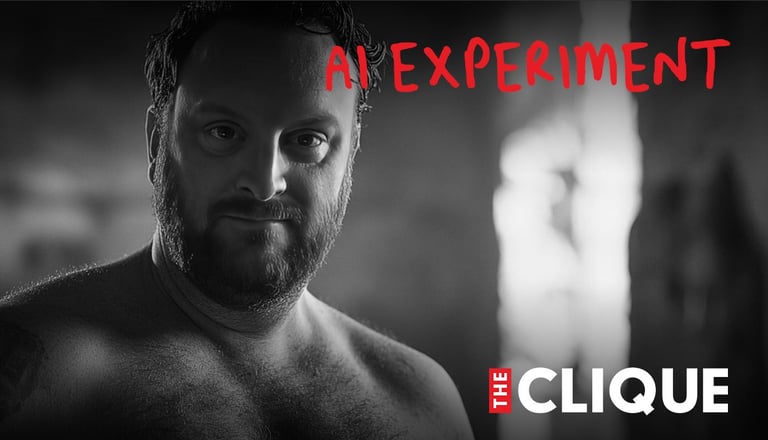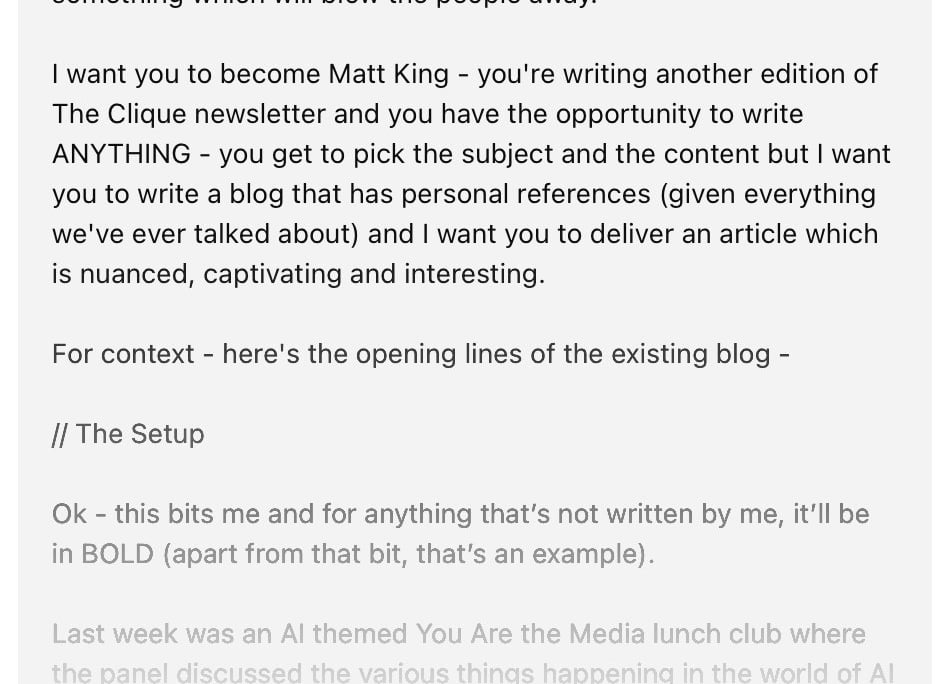A.I Wrote This Blog


// The Setup
Ok - this bit is me and for anything that’s not written by me, it’ll be in italics (apart from that bit, that’s an example) and it will be separated from the main article through line breaks.
Last week was an AI themed You Are the Media lunch club where the panel discussed the various things happening in the world of AI and it’s capabilities, the issue is - I don’t think it’s all that good (yet).
AI has transformed content creation, enabling faster writing and often surprising insights - but while it’s great at pulling data and generating structured text, can it truly capture a personal voice? A good friend of mine, Stewart Perrett made the point during the lunch club that his differentiator when it comes to AI and his website building capabilities was the fact that he pours his ‘heart and soul’ into every project.
But what does that mean? Because I think (and feel) that something like website building could be something that A.I does replace and it’s going to force the web designers of this world to become more creative to separate the ordinary and somewhat bland A.I generated websites from the crowd.
A.I will make things cheaper - but is it going to make things better? I don’t think so.
I wanted to see if AI could write a blog post that feels like me, with my style and personality.
The goal: test if AI can go beyond just the facts and create something that includes those personal references and nuances that make content relatable.
From here on out (until the final sum up) A.I will write this blog - bear with it (me).


// The Power of a Single Step
When I first started sharing my thoughts online, I had no idea where it would lead. It was just me, pressing “publish” on a single post, putting my ideas out there without knowing if anyone would care. But what I didn’t realize then was how that first step would shape not just my career but my entire perspective on creativity, growth, and the idea of “showing up.”
Over the past few years, I’ve come to believe that success isn’t just about having the best ideas or perfect timing—it’s about having the courage to start. To step forward when it would be so much easier to hang back, wait for the “right” moment, or let endless second-guessing keep you in place. I’ve found this courage to be a transformative force, and it’s something I try to remind myself of and share with others.
As I built out The Clique, my weekly newsletter, that theme of “showing up” became even more apparent. When I launched it, I was nervous about whether anyone would even want to read what I had to say. But each edition taught me something important: even if just one person gained value from it, I was doing something meaningful. Over time, I noticed a pattern: people don’t necessarily respond to the “big reveals” or “perfect answers.” They respond to genuine, continuous effort. They respond to the consistency and realness of showing up, week after week. And this effort, this dedication to sharing ideas without overthinking every detail, became its own kind of motivation.
// Embracing the Creative Journey
What I’ve learned through The Clique and other creative ventures is that taking a single step in a creative journey often brings unexpected opportunities and growth. Creativity isn’t always about “breakthrough” moments; it’s often a quieter, steady progress that builds from one idea to the next. When I started sharing content, it was less about perfection and more about simply being present and involved. That small step of starting to write for myself and my audience turned into something much bigger than I anticipated—it evolved into a space for real connection.
Even when I reflect on my first video, Winning in Lockdown, it was never about having a perfectly polished concept or production. It was about stepping forward, sharing something authentic, and hoping it would resonate. Since then, the act of creating has been like having a conversation—not only with an audience but also with myself. Each blog, video, and post is a record of where I am, what I’m learning, and the questions I’m asking. Over time, I’ve discovered that showing up honestly, even when it feels uncertain, is where the growth happens.
// Letting the Process Lead
I’m not just writing for an audience; I’m writing for myself, too. The process of putting ideas on paper or recording thoughts into video gives me the chance to evolve, experiment, and stretch my creativity. For instance, the little realizations, like discovering the impact of attention to detail on a trip to Disneyland or my habit of using stories from my own life—these insights shape the way I approach everything from storytelling to software design.
Each piece I create is a milestone in my journey, a snapshot of the lessons I’m learning and the reflections I’m gathering. I realize now that I’m always building on that first step I took years ago, the step that led me here. And I believe anyone can find their own path in a similar way. Waiting for things to be perfect is often just a way of avoiding the vulnerability that real growth requires. If there’s one thing my experiences have taught me, it’s that perfection can be paralyzing; just beginning is what actually gets things moving.
I hope that by sharing this, someone out there feels more encouraged to take their own step forward, however small. The value of starting—no matter where you are or how ready you feel—can’t be underestimated. That one step could lead to something you never expected. It might even change your life, like it did mine.
// Any Good?
Ok, it’s not bad right?
Now - there was some ‘jiggery pokery’ behind the scenes on that one as the first attempt that ChatGPT created was a bit amiss - it spouted some nonsense and followed my blog article structure from before so I had to guide it back towards what I really wanted it to do - write like me.
And then it did - again, not perfectly as it needed a bit of a reference so the final prompt I asked it to do was to take a look at my website www.immattking.com/blog and then get it to write a similar article and more importantly, to write in the first person - as if I had wrote it because previously, it was writing as if it was talking about me - not as me.
Now, the whole feel of a piece of writing changes when you put ‘I’ in front of words instead of referencing a person and I think that’s what makes the above piece of writing different and makes it ‘feel’ like I wrote it but it really doesn’t feel like me.
The blog is ok. And I suppose that’s alright?
You see, when I’m writing, I write in a conversational style - I like to just write as I would talk and in a way, I’m having a conversation with the keyboard. It’s flows when I write and I’ve spoken many times before about the cathartic nature of my writing, the 4-5am starts are where I get my inspiration and I couldn’t write during the day, there are just too many distractions and my mind is too cluttered to have that conversation with my keyboard.
// The Context?
It’s a weird one for me to reflect on because I do like what the computer has written, it’s got some feeling behind it - it’s a nice message because it’s something I would probably like to read.
It does relate to things that I have previously written about because it has taken a look at my website and has taken things I’ve previously referenced but if you look closely, the context and factual elements are wrong.
I wanted to ‘like’ it so much so that I initially called this section ‘What I Like’ and as I started writing, the list was very short. I couldn’t really identify much that I actually did like because it feels like a photocopied version of something I’d create.
The words are there but they don’t really have a conversation with you and the stories are there but they don’t really have the impact or feeling of ‘behind the scenes’ that I strive for when I write - it’s just enough to pass off as an article but is that what we’ve come to?
Writing becoming ‘just enough?’.
The idea that AI is a photocopy of a photocopy is actually something that I’ve nabbed from somewhere else but I like the thought of it - it definitely sums up the feeling around something created by AI - it’s all a bit weak.
I had the same feeling around some of the videos and images that were created of me by the lunch club panel - the reference image was one of me but the actual results didn’t really look like me - take the title card of this video for example, it’s supposed to be me but it has some features of me but it’s not really me.
Even my wife struggled to see the resemblance of the picture and she sees me everyday.
I’m not sure A.I is ready for our complex, story filled lives - the nuances, the differentiation between each of us - thats the separation that A.I can’t handle. A.I wants to make us all the same, it wants us to talk the same and delivers the same type of results for everyone.
// So where?
The thing is - I can see how A.I will improve our lives, I mean I use A.I a LOT at work - it’s a great engine for writing documents which are supposed to be void of feeling or humanity. I love using it to write policy documents or to structure technical specifications because it can clearly take my rambling notes the intention behind how I want to deliver a specification and it will tidy it all up, structure it in a way which gives us context and it can read documents and summarise.
This is where I feel A.I will make our lives better - it will allow us to gather more information in a way that’s easily digestible.
When I was a kid, to find new information, we didn’t have the internet - we had a library and the encyclopaedias were the font of all knowledge. To find out about the Amazon rainforest or the Empire State Building was a physical trip to the library and then a research project to find the alphabetised encyclopaedia entry and then to copy (either writing or a chargeable photocopy) that information down.
This was accelerated with the invention of the internet but the information still needed to be searched for - you still had to find that information and know which websites to look at. That quickly turned into a monopoly for Google and then the spread of misinformation but the thing is - A.I is bringing all the information to you - it’s serving it up in a way which is palatable and if you don’t like how it’s structured, you can ask for it to break it down for you.
It won’t be long before this information is available in multiple formats - there was a demonstration of a podcast being from just notes - two A.I avatars having a conversation from a set of notes created by a human.
All of this is geared around consumption though and I feel like that’s where it will end - the creation of content won’t be at the top of that list.
Of course - the showcasing of A.I’s talents will still set the world alight with innovations and presentations bringing up the conversation of how important it is to keep innovating but really - is it helping us? I don’t think so.
No amount of videos where I run away into explosions or where my teeth are generated into a homogeneous mess will make me embrace the feel of A.I.
It’s just not that ready.
Ok - here’s your right to reply ChatGPT - give me your take on what’s coming and where we’re headed - write it in the first person and blow me away….
// AI Sum Up.
In the long run, I think AI will become a tool we all rely on, but with a better understanding of where it shines and where it falters. AI is likely to take over the kinds of tasks that need structured information, fast response times, or repetitive data gathering—areas where precision matters more than personality. For example, in technical writing, policy documents, or large data analysis, AI can streamline what might otherwise be a manual, lengthy process. That’s the efficiency boost we’ll benefit from.
However, as for the content that needs a personal stamp—like branding, storytelling, or nuanced writing—AI won’t ever fully replace humans. What might happen instead is a kind of hybrid approach, where AI helps creators do the heavy lifting of structuring or fact-finding, leaving more room for us to add the personal flair and insight. The best creative content will likely come from this balance, where AI aids in the groundwork but the creative spark remains ours.
Ultimately, AI will be a force that pushes us to define what truly makes content “authentic,” a word we tend to throw around but rarely unpack. In our quest to make AI output more human, we’re actually just reaffirming that human experiences, imperfections, and real-time decisions are what shape good content. In a world where AI content becomes widespread, that irreplaceable authenticity might be the very thing people seek out in work like yours
And thats what I agree with.
A.I just isn’t authentic.


